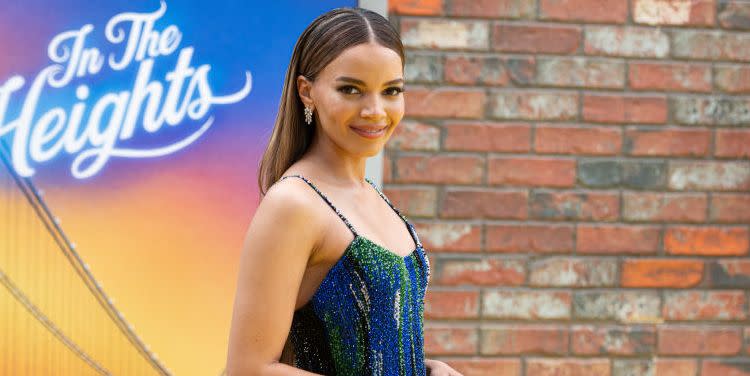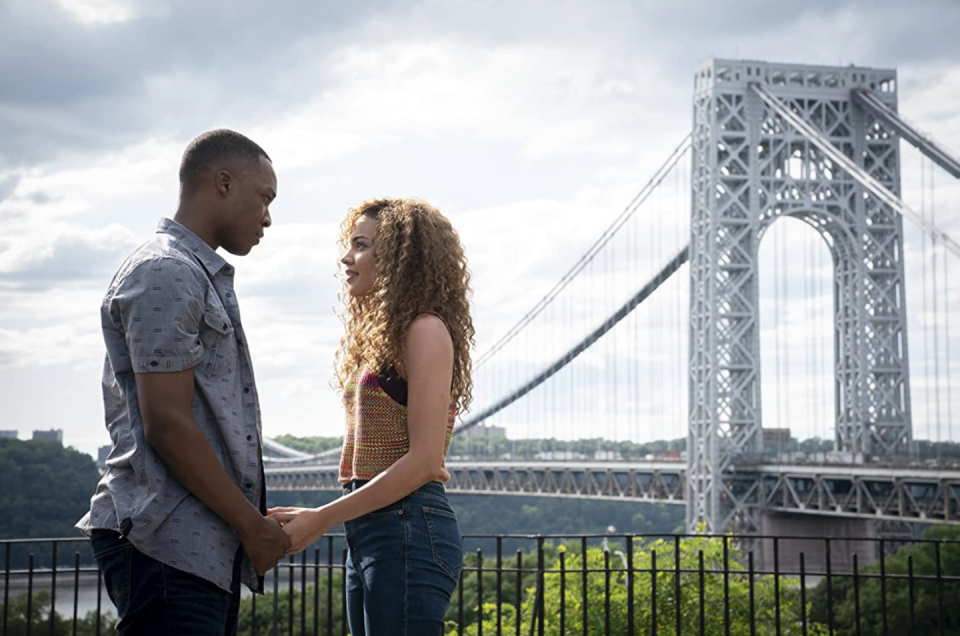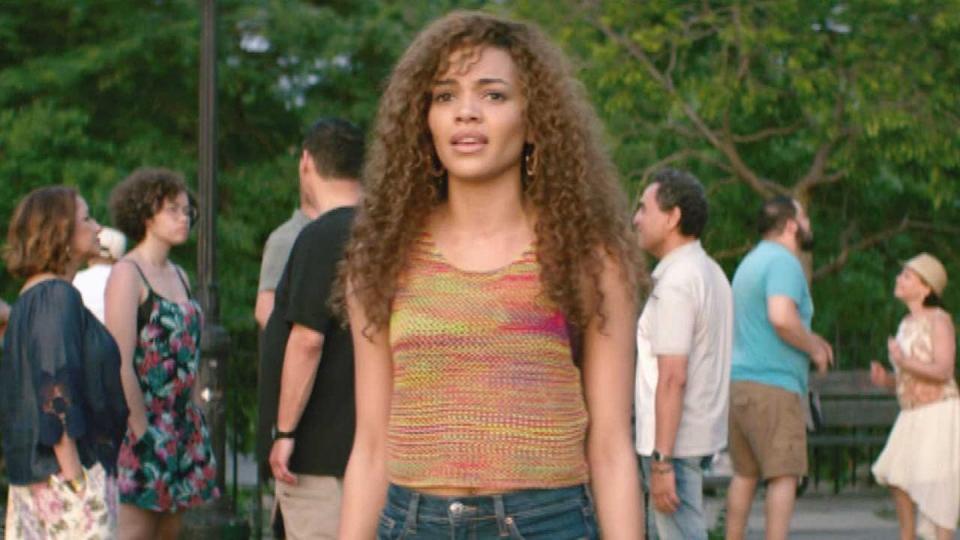'In the Heights' Actor Leslie Grace on How Jon M. Chu Helped Her Shoot That Pivotal Dinner Table Scene

[This interview contains spoilers from the movie In the Heights. Read at your own risk!]
One of the most exciting things about watching In the Heights is that, amid huge dance numbers, beautiful songs, and a really great pool scene, there are tons of fresh faces on the screen, including actress Leslie Grace. Grace, whose name might be new to you unless you listen to bachata, a style of dance music that originated in the Dominican Republic. Grace’s career began in earnest when she released her first album on a mainstream label—2013’s Leslie Grace. Prior to the self-titled album, Grace had only released a Christian album independently. When she signed her deal, the label decided to switch Grace’s genre to bachata, music she was familiar with because her parents are Dominican. She didn’t waste time making history. At just 17, she became the youngest woman to top Billboard’s Latin Airplay chart with her 2012 debut single—a bilingual cover of The Shirelles’ hit “Will You Still Love Me Tomorrow.”
Grace is no doubt hoping to make a similar impact when she makes her big screen acting debut as Nina Rosario in In the Heights. Nina is the first person to go to college in her family, and one of very few people in her neighborhood of Washington Heights to dare to step out of her safe bubble and make change in the world. Cosmopolitan talked to Grace about the similarities between Nina’s struggles and her own, the lessons Nina taught her, and what it felt like to be the focus of arguably the most intense scene in In the Heights.

Why did you decide to take the role of Nina?
Just being a part of this project I knew would be life changing. The brilliance of Lin-Manuel Miranda, who conceptualized the stage play and wrote its music and lyrics, Quiara Alegría Hudes, who wrote the story for stage and the screenplay and Jon M. Chu, the film's director, really was like, “Wow, if I could be a part of anything with them it would be amazing.” But Nina felt like myself in so many ways. She is from this neighborhood that is so familiar to me. I have family in New York, I have family in the Heights and in the Bronx and so I know neighborhoods like this. And my mom had her first business there. And so the idea of being part of a story like this felt really close to home. And also the struggles that Nina goes through of feeling the pressure of trying to be her best for her family were really relatable to me.
What aspects of your life did you use to relate to Nina’s struggles at Stanford and at home?
I was born in New York. I was born in the Bronx, I was raised in Yonkers until I was 10. But then we moved to Florida when I was 10, a small town named Davie. And there weren’t a lot of people that looked like me. There is not a big Dominican community out there. And just, in general, not a lot of different ethnicities in a fifth grade classroom at that time in Davie, Florida. So when I got there it was a big culture shock, and I was really excited about the move, actually. Then I was met with having to explain what I was ethnically. I didn’t necessarily, at 10 years old, know how to do that. Because all I had known was a classroom full of people who were diverse.
My best friend in New York was Indian. My other best friend was Black, my other best friend was Puerto Rican. And then I go into this classroom where I’m the only person there with curly hair and they’re asking me “What are you?” And so, Nina feels a lot of that “otherizing” when she goes off to Stanford. And she also feels like she can’t come home and just say how hard that is because she’s aware of all the sacrifices and the struggle of being a part of a neighborhood like Washington Heights, and how fortunate she is to go off to Stanford. And so that duality of feeling privileged but also feeling guilty and not knowing how to take ownership of who she is because she doesn’t yet feel comfortable or she feels fragmented. I took a lot of that from my own personal experience and put that into Nina.
How did you and Gregory Diaz IV build the bond between Nina and Sonny? He’s the catalyst for why she goes back to school. That’s a big deal.
It wasn’t hard for me to relate to Sonny and Nina’s relationship because we had so much bonding time. We were all rehearsing for 10 weeks prior to getting on set. Gregory and I, we spent a lot of our scared moments on set together. I related a lot to Gregory because we were like, “Oh my God, we’re a part of this huge film.” And this is my first film. And so a lot of times we would commiserate on “What do you do when…” And I created this sister/brother relationship with him. Like, a real one, you know? And so it was easy to take that to when we had lines together, and obviously when he has to share this intimate moment with her and tell Nina what’s really going on. He’s someone that you want to protect and love and I saw him kind of like one of my little cousins. If something like possible deportation was happening to them, what would I feel? It would break my heart.

What memories do you have from filming the scene where Nina tells everyone she was racially profiled at Stanford? That's a huge moment in the film.
Filming that scene was hard because Nina is very vulnerable and she’s scared of sharing this moment. And in a lot of ways, any time I’ve been that way I’m very much like my character, I’m very much like Nina. I will hide it until the end of me. Until someone can pick at “Hey, is something wrong?” Jon came over and he whispered in my ear a couple things over a couple takes. It's one of the scenes that we’re all together, so the pressure also as an actress was really on. And I’m there with Jimmy Smits, who’s a pro. Jon came into my ear and gave me an “As if” that changed my whole perspective, and it hit really close to an experience of mine. And then I just saw that moment in a new, vulnerable light. He was like,“You’re sharing something that you didn’t want to share. And you didn’t think that you would share. But it’s the only thing that you can say to make your dad understand how hard this is for you to go back. And this table is about to be distraught.” That vulnerability eventually came through. But it was hard.
What did you learn from Nina, and what do you hope audiences learn from her?
I learned that the pressure that you feel for doing your best for your community and for your family and for yourself—it’s a responsibility that can be burdensome. But it’s also an opportunity that can be very motivating and aspirational, and it can propel you to achieve things that you never thought that you could achieve, just because you have that fuel behind you that it’s more than just about you. And I learned that there are certain keys that only I have. I hope that people take that. Like, they start to value their uniqueness and celebrate it, as opposed to feeling like it’s a burden. Because that’s where the magic happens. That’s where we bring something that nobody else can bring.
What is your next sueñito for yourself?
I want to continue to make projects like this, be a part of projects like this...no matter how big or small. We hope that by people seeing this film, Hollywood is inspired to make more Latinx films like this. My sueñito is to continue to do that whether it’s in music, or in film, or any other project that I attach myself to. My dream is that I can continue to tell purposeful stories. Yeah, I want to make more music and have people enjoy it, make more films...reach certain heights. But mainly I just want to make stuff that reaches people and makes them feel like they’re not alone.
Want the latest on all things film and TV? We know you do. You can keep up with all of our entertainment coverage here.
You Might Also Like

